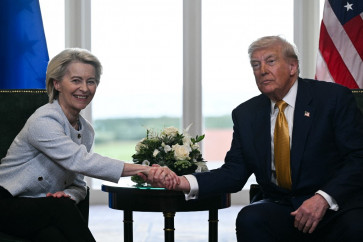Popular Reads
Top Results
Can't find what you're looking for?
View all search resultsPopular Reads
Top Results
Can't find what you're looking for?
View all search resultsIs China a neighbor to Indonesia?
One might wonder why this question should be asked
Change text size
Gift Premium Articles
to Anyone
O
ne might wonder why this question should be asked. More importantly, does it matter? This article is about Indonesia sharing maritime areas with other countries.
Pursuant to the international Law of the Sea, a country is entitled to maritime zones with specific breadth measured from its baselines seaward. They are: territorial sea; contiguous zones; exclusive economic zones; and continental shelf. If a country is situated in relatively close proximity to other countries, there will be overlapping maritime entitlements that require maritime boundary delimitations. These countries are what this article refers to as neighbors.
Indonesia officially recognizes 10 neighbors with which it must settle maritime boundaries: India, Thailand, Malaysia, Singapore, Vietnam, the Philippines, Palau, Papua New Guinea, Australia and Timor Leste. Put simply, Indonesia considers a country as its neighbor for maritime delimitation purposes if there are overlapping maritime entitlements between them pursuant to the international Law of the Sea.
In a guess lecture at the Sepuluh Nopember Institute of Technology (ITS) in Surabaya earlier this year, a participant asked me how about a country that we do not recognize as a neighbor but acts like one? The participant was referring to China. As reported in 2009 and 2010, Chinese fishermen came to fish in the waters north of Indonesia’s Natuna Islands.
Pursuant to the Law of the Sea, the water area falls under Indonesia’s territory or jurisdiction. Should maritime division be required in the area, it is the business of Indonesia and other countries, the maritime entitlement of which extends up to the South China Sea.
The question is whether or not China’s maritime entitlement extends up to the north of Natuna Islands?
In a verbal note to the United Nations (UN) in 2009, China stated that: “China has indisputable sovereignty over the islands in the South China Sea and the adjacent waters …” This asserts Chinese claim over land territory and maritime areas to the north of Indonesia’s Natuna Islands, which is also disputed by other countries in the region.
On the other hand, Indonesia does not claim any small island in the South China Sea, and does not consider China as a neighbor in the context of maritime delimitation. Indonesia only considers Malaysia and Vietnam as its neighbors with which maritime boundaries need to be settled in the South China Sea.
In other words, Indonesia does not even see that it has to deal with China when it comes to maritime entitlement in the South China Sea.
However, the presence of Chinese fishermen in the area in 2009 and 2010 seemed to suggest the opposite. Not only did the fishermen come to fish in what Indonesia believes to be its waters, but they were also guarded by a “Chinese fishery administration vessel”. It can be inferred that China extends its maritime claim up to an area which Indonesia believes to be its own.
This Chinese claim, as also depicted in its 2009 note to the UN, started in the late 1940s when a map depicting a broken line in the South China Sea was published. The line, also known as the nine-dotted line, indicates Chinese claim extending to a maritime area close to Indonesia’s Natuna Islands.
However, there has been no clarification whether the line indicates Chinese claims over small islands (e.g. Spratlys, Paracels, etc) in the South China Sea only, or also over maritime areas enclosed by the line.
Meanwhile, in its note in 2010 to the UN, Indonesia did not recognize China’s claim over maritime areas enclosed within the line. While differences in views between Indonesia and China need further clarification, the presence of Chinese fishermen in the waters around Natuna Islands indicates Chinese assertion of its entitlement to maritime areas to the north of Natuna Islands.
The 2009 and 2010 fishing incidents appear to be a maritime boundary dispute between Indonesia and China. While Indonesia has been consistent not to acknowledge China as one of its maritime neighbors, it seems China has a different view. To overcome this, the very first thing required is clarification from China regarding the extent of its territorial, and particularly maritime, claims in the South China Sea.
On the other hand, as stated by Johnson (1997), Indonesia may not want to openly discuss overlapping claims between Indonesia and China as this, in Indonesia’s perspective, may give legitimacy to China’s maritime claims in the South China Sea. As the late foreign minister Ali Alatas once stated: the “repetition of an untruth will eventually make it appear as truth” (The Straits Times, June 4, 1995).
Is Indonesia neighbor to China? It seems that there has been no clear-cut answer. Whether or not Indonesia and China need to delimit maritime boundaries between them depends on how the two countries see overlapping maritime claims between them, which remains uncertain.
Apart from the uncertainty, it seems that Indonesia and China pay more attention to fishing activities in the South China Sea. To prevent illegal fishing by Chinese fishermen in Indonesian waters, coordinated patrols are being planned (The Jakarta Post, May 23, 2011).
One important point to note from Defense Minister Purnomo Yusgiantoro is that Indonesia indirectly recognizes the existence/potential of maritime boundaries between Indonesia and China. Yusgiantoro states: “under a coordinated patrol, if those fishing vessels accidentally cross the border, we will inform them to leave.”
Notwithstanding this possibility, Yusgiantoro also asserts that Indonesia does “not have any bilateral problems” with China.
Does it mean Indonesia now has more than 10 neighbors with which to settle maritime boundaries? Does it add further complexity to the already complex maritime boundary issues Indonesia is currently facing?
Indonesia must be ready for any and all possibilities; let us see, as everything remains to be unveiled.
d to be settled in the South China Sea.
The writer is a lecturer at the Department of Geodetic Engineering, Gadjah Mada Universit, Yogyakarta. His research interest is in technical/geodetic and legal aspects of maritime boundary delimitation. This is his personal opinion.










